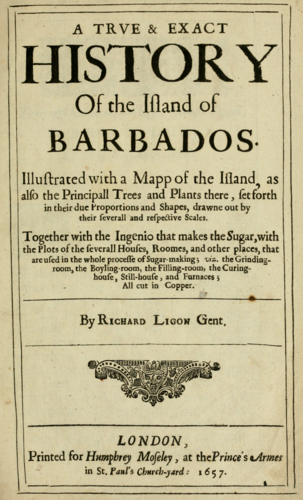Key Text: A True and Exact History
 Of the key texts described in this exhibit, Richard Ligon's A True and Exact History is by far the earliest, and the only 'non-fiction' piece. Ligon's work is extensive, featuring not only Obeah, but also important natural histories and embedded slave narratives.
Of the key texts described in this exhibit, Richard Ligon's A True and Exact History is by far the earliest, and the only 'non-fiction' piece. Ligon's work is extensive, featuring not only Obeah, but also important natural histories and embedded slave narratives.
In 1647, Ligon traveled to Barbados with a group of royalist exiles as an aid to the planter, Thomas Modyford. He spent three years in Barbados, working as a plantation manager, before returning to England in 1650, because of illness. During the three years he spent in Barbados he recorded nearly everything he saw, giving us an extensive understanding of how the colonizers saw the Caribbean. Ligon’s The History was the first extended English account of Barbados and has been a particularly important source text for historians of the Caribbean and of English colonization.
Literary scholars have put Ligon’s text into conversation with early modern travel, scientific, and political writing, and have often read his text as an ideological document, articulating an emergent colonial position. The parts that on Obeah are some of the first written accounts of the practice-- in fact, the text predates the practice being named as Obeah, but rather just a noted as a religious practice among the enslaved (the word Obeah, and its related terms, are featured nowhere in the text). Literary scholars and historians have deduced that this practice was Obeah after the fact. This, of course, fell before the practice was well known by the colonizers, and thus was not subjected to as harsh of scrutiny, and for the most part, the law was not quite as involved.
